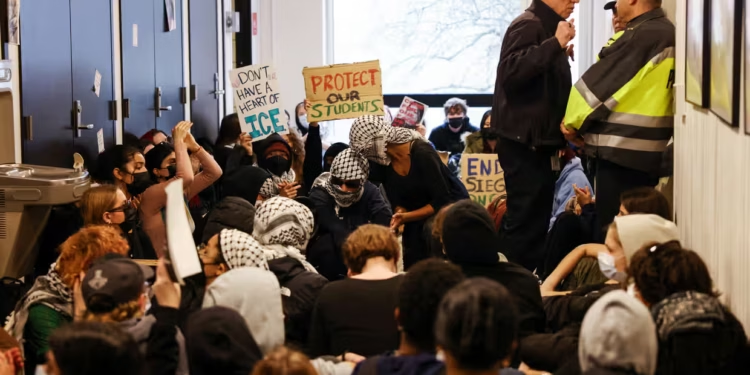The U.S. government’s decision to revoke over 600 student visas, affecting international students across more than 100 universities, has sparked significant controversy. A large portion of these revocations appears to target pro-Palestinian activists and those participating in protests related to the Gaza conflict. What is especially concerning is that the revocations are not limited to political activism; even students with minor infractions, such as traffic violations, have faced visa cancellations.
Political Dissent and the Crippling of Free Speech
The visa revocations come in the wake of the U.S. State Department’s newly launched “Catch and Revoke” program, designed to target individuals deemed to be supporting Hamas or other groups the U.S. government has labeled as terrorist organizations. In reality, this crackdown appears to disproportionately target students expressing political opinions—specifically those speaking out on behalf of Palestinian rights or engaging in anti-Israel demonstrations.
While the U.S. government claims these actions are a matter of national security, critics argue that the program threatens the First Amendment rights of students to express political views freely, particularly when those views oppose the U.S. government’s position on the Gaza conflict. The data compiled by Inside Higher Ed suggests that a large number of the affected students had their visas revoked not due to any criminal activity, but simply because of their participation in protests or the expression of political opinions online.
Cases of Activism and Minor Infractions
Among the most troubling cases is that of Felipe Zapata Velázquez, a Colombian student at the University of Florida, who was deported after being arrested for minor traffic violations, including having an expired vehicle registration and a suspended driver’s license. His case, along with others like it, raises serious questions about the fairness and transparency of the visa revocation process. Was Velázquez deported because of his minor offenses or because of his support for pro-Palestinian causes? His deportation, which Florida Democratic Congressman Maxwell Frost called “kidnapping,” highlights the growing politicization of immigration enforcement under the Trump administration.
Similarly, Mahmoud Khalil, a recent graduate of Columbia University, and Rumeysa Ozturk, a Turkish student at Tufts University, are also fighting deportation after their activism in support of Palestinian rights drew the attention of immigration authorities. These cases underscore a pattern where political activism, particularly on sensitive international issues, has led to retaliatory actions by the U.S. government.
The Catch and Revoke Program: A Step Toward Authoritarianism?
The “Catch and Revoke” program, powered in part by artificial intelligence, has allowed immigration authorities to use social media as a tool for monitoring and targeting political dissent. This approach raises significant ethical concerns, as it allows the U.S. government to police political speech and activism on a vast scale. By scraping social media for posts that appear to support Hamas or other designated terror groups, the program effectively criminalizes free speech, especially when that speech challenges U.S. foreign policy.
While the U.S. government claims the program is focused on national security, it is becoming increasingly clear that the real target is political dissent. The fact that students with minor non-criminal offenses, such as traffic tickets, are also being targeted suggests that the true aim of the program may be to stifle activism and intimidate those who speak out against the status quo.
A Chilling Effect on Free Speech and Student Activism
These visa revocations are having a chilling effect on activism and free speech across U.S. college campuses. International students, who have long played a vital role in promoting diversity of thought and political expression, now face the threat of deportation if they take part in protests or express opinions that are not aligned with U.S. government policies.
This creates an atmosphere of fear where students are increasingly reluctant to engage in activism or even express their views publicly. In the long term, this could undermine the very foundation of higher education in the U.S., which has traditionally been a space for open debate and the free exchange of ideas.
The Price of Political Dissent
The U.S. government’s decision to revoke the visas of over 600 international students is more than just an immigration issue—it is a direct assault on free speech and political activism. By targeting students who participate in pro-Palestinian protests or express opinions that challenge U.S. foreign policy, the government is sending a clear message: dissent will not be tolerated.
As the number of visa revocations grows, it is essential that we ask ourselves whether this is the America we want to live in—an America where political expression is punished, and activism is criminalized. If the U.S. government continues down this path, it risks eroding the very principles of democracy and free speech that it claims to champion.
The time has come for a reassessment of these policies, ensuring that political opinions—no matter how controversial—remain protected, and that students can continue to express their views without fear of retaliation.
Relates stories:
Trump Administration Admits It’s Trying to Deport Mahmoud Khalil Over His Political Beliefs
Trump Plans $998 Daily Fines for Undocumented Migrants
Trump Signs Executive Order to Dismantle U.S. Department of Education
Trump Administration Bans Hundreds of Diversity and Inclusion Terms from Federal Records
















